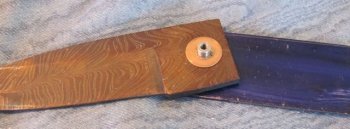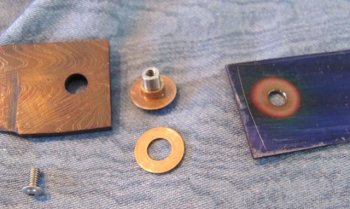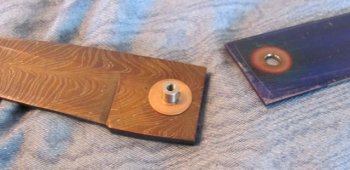After reading some of the comments in this thread I did a little investigating on my own. I have been making folders a long time during my 32 years of making knives. I have made linerlocks for 11 years and have used the materials mentioned here. I used a very accurate micrometer to measure my teflon sheet that I use for pivot washers. The mic showed thickness of the teflon to be exactly .0215" all the way around the sheet (one square foot) every 1/2". When the sheet is cut in half the center measures .0215" every 1/2". I don't see how you can be anymore consistent than that. I then used my micrometer to see how much pressure it took to squeeze the teflon and see how much it deformed. I tightened the micrometer against the teflon washer that I had punched out and it tightened less than one tenth of a thousandth with more torque used on it than a folder pivot is ever tightened. I don't see the discrepancies that have been mentioned about teflon. I have carried my own knives with teflon washers for years and have no problems with the teflon. I carried one with nylatron washers and used it every day and had problems with the nylatron beginning to drag. I have never had trash get between the teflon washers and the blade. This can only happen if you have gap between your blade and the washer. If there is no gap you cannot convince me that trash will work it's way between the washer and blade. I have not had it happen. PB makes good washer bearings if it has the right amounts of four alloys, copper, tin, lead, and zinc. I ordered some precision brass sheet used for accurate shim stock and I find that some of it can be thinner in spots but not more than one tenth of a thousandth. If you buy teflon washers that are punched out you may have some deformity and that is why I make my own with a two step process that never squeezes the teflon. Sure, teflon can deform. If you take a piece of teflon 12" long and say 2 " in diameter and stand it on its' end, over a period of time it will get shorter by a few thousandths. When working on piping projects I used it for gaskets on piping that carried corrosive liquids and gases. A gasket 1/8" thick could deform a good bit if tightened too much. You could use a torque wrench on the bolts and pull it to the required torque for this type of gasket and come back the next day and the gasket would show signs of bulging. Thick pieces of teflon will deform under pressure but using it as teflon washers in a linerlock just does not get that much compression. A lot of materials get the blame for knife problems when it is more a problem of fit up than materials. Just like blade pivot materials. Some use bronze bearings over a stainless pivot when this is not necessary. I have used 303, 18-8 ph, and other stainless alloys for pivots and have experienced no wear over a period of many years on knives that I use all the time. Stop pins are another component that the type of material used is up to the maker. I use 18-8 for my stop pins and there is not enough impact on opening to cause wear on the pin over several years for it to be seen in the lock up. If the point of contact between the stop pin and the blade is dead square the distribution of impact on the pin is spread across the pin and not in one small point. But , I digress. This thread was about washer material and I will leave it at that. The misconception about strength in screws is another fertile ground.



